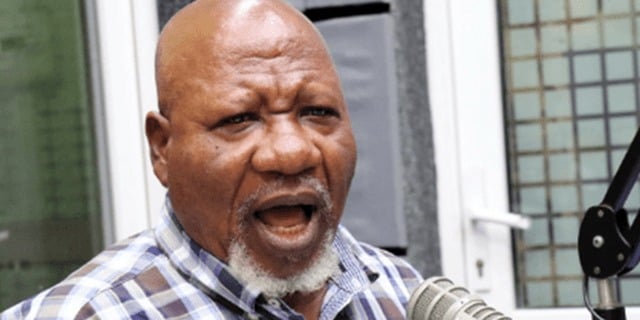In a recent commentary, Bernard Allotey Jacobs, the former Central Regional Chairman of the National Democratic Congress (NDC), provided a cautionary perspective regarding the political landscape in Ghana, focusing on the upcoming presidential election. His statements come in the wake of the former U.S. President Donald Trump’s electoral achievements, which have sparked some of Jacobs’ party members to draw parallels between Trump and Ghana’s former President John Dramani Mahama. Supporters of the NDC have expressed the belief that Trump’s return to political prominence could bode well for Mahama’s chances in the upcoming election due to perceived similarities in their experiences as former leaders. However, Jacobs firmly disagrees with this assertion, emphasizing that the political contexts of the United States and Ghana are vastly different and should not be conflated.
Jacobs articulated his views on the Peace FM’s Kokrokoo morning show, where he highlighted the imprudence of making electoral predictions based on foreign political events. He specifically addressed the NDC supporters who might harbor the notion that Trump’s success signals a parallel outcome for Mahama in Ghana’s electoral race. Jacobs insisted that such thinking is illusory and overly simplistic, cautioning that “it is not possible!” Sometimes, political analysts and party members try to draw lessons from international scenarios without considering the distinct socio-political and historical factors that shape each country’s electoral systems and electorate behaviors. Jacobs stands firm in his belief that any comparisons drawn between the two former Presidents are misleading.
Moreover, Jacobs shifted the focus from speculation to his strong endorsement of the ruling New Patriotic Party’s (NPP) candidate, Vice President Dr. Mahamudu Bawumia. He expressed a firm conviction that Bawumia has the potential to win the presidency against all challenges and odds. This assertion, made with confidence, reflects Jacobs’ analysis of the current political dynamics and his belief in Bawumia’s capabilities as a candidate. In a political environment often characterized by volatility and unpredictability, such endorsements carry weight, particularly when they come from seasoned party members like Jacobs who have substantial experience and insight into Ghana’s political mechanics.
Jacobs’ remarks come in a context where political speculations and predictions are rampant, especially as several factions within the NDC seem to hold on to the notion that they can ride on international political trends. It is crucial for political parties, especially the NDC, to focus on their internal strategies and voter engagement to sway public opinion and gain traction in the electoral race. Jacobs’ advice serves as a reminder of the need to ground their campaigns on substantive national issues rather than chasing shadows cast by overseas events. He suggests that the party must analyze the local political landscape, the sentiments of the Ghanaian electorate, and the incumbent administration’s performance instead of solely relying on the implications of a foreign electoral scenario.
Additionally, Jacobs highlighted the importance of nurturing a realistic outlook on electoral prospects. He underlined the necessity for the NDC to initiate constructive strategies that resonate with the electorate’s needs and aspirations, highlighting that mere correlation with international political outcomes may lead to complacency or overconfidence. For a party aiming to win back the presidency, engaging with the citizenry, understanding local concerns, and effectively addressing them is paramount. This approach contrasts with a passive reliance on external political happenings, which may not necessarily translate into favorable outcomes back home.
In conclusion, Jacobs’ message encapsulates a broader warning against the dangers of overreliance on foreign electoral narratives and underscores the importance of developing homegrown strategies reflective of the Ghanaian context. His confidence in Dr. Bawumia as the next president reflects a significant shift in the political landscape and indicates the need for the NDC to recalibrate their campaign strategies. As the election nears, it becomes increasingly essential for the party to focus on solidifying its base, reevaluating its policies, and ensuring they resonate with the electorate instead of seeking comfort in unattainable overseas parallels. Ultimately, Jacobs’ insights serve as a clarion call for grounded political engagement, highlighting that real success in politics comes from addressing domestic realities rather than mirroring international developments.


